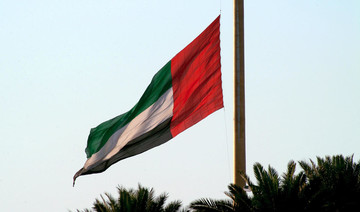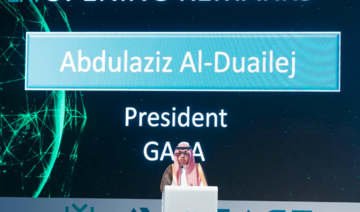LONDON: It was the year cryptocurrencies fell to earth — the crash has been so severe that parallels have been drawn with the dotcom bust at the turn of the millennium.
Bitcoin is down 80 percent from just under $20,000 12 months ago to about $3,500 in December. Similar falls have been recorded by other cryptos such as ethereum.
The reasons for the bust are well rehearsed: Increased regulatory oversight, especially from the US and China, the emergence of scams linked to a proliferation of cryptocurrencies launched via initial coin offerings (ICOs), and disagreements among cryptocurrency’s developers about how to update the underlying software.
But interviewees told Arab News that the market would recover and that, just as the dotcom boom went on to produce Amazon, so the world of cryptocurrencies shouldn’t be written off.
Dubai-based entrepreneur and investor, Najam Kidwai, a board-adviser to Fusion.org, a not-for-profit foundation that aims to develop blockchain infrastructure for cryptofinance, told Arab News that all innovations needed time to mature and cryptocurrencies were no different.
He added: “Change needs to be regulated, but if you are doing
everything above board, new technology should enhance the user experience, that’s the idea of technology — to make life easier.”
In the interim, he predicted, institutional money will flow into “the crypto space,” even as retail investors take fright. Banks and hedge funds had been looking at cryptocurrencies, and building risk and compliance infrastructure to support trading, he said.
Chris Beauchamp, senior market analyst at London-based IG Group told Arab News: “They (cryptocurrencies) aren’t doomed, they’re just not going to change the world overnight. Bitcoin still has the heft to remain part of the financial world, but others will probably fade or evolve over time, like the airlines and car firms of old.”
Despite the cryptocurrency crash, most observers agree that blockchain, the technology that underpins the new tokens, will continue to spur public and private investment, and perhaps nowhere more so than in the Gulf.
Here, there have been some major developments in 2018. Abu Dhabi-headquartered Al Hilal Bank has carried out a blockchain-based transaction for an Islamic bond worth $500 million; Abu Dhabi National Oil Company (ADNOC) is collaborating with IBM to pilot a blockchain supply chain system; and KSA’s central bank has signed an agreement with US fintech company Ripple to run a pilot project to help banks settle payments using blockchain.
Kidwai said: “Cities like Dubai have bet very heavily on blockchain. A lot of proof of concept work is going on as Dubai wants paperless government, so there is an initiative here called Smart Dubai, driven by the ruler of Dubai. There is a desire for transparency and speed in government.”
At its heart, blockchain is a relatively straightforward concept. It’s a ledger of blocks of information, such as transactions or agreements, that are stored across a network of computers. This information is stored chronologically, can be viewed by a community of users, and is not usually managed by a central authority such as a bank or a government. Once published, the information can’t be changed.
Gartner analyst Rajesh Kandaswamy told Arab News that even though speculators had poured billions into cryptocurrencies, that didn’t “invalidate the underlying blockchain technology”.
“Blockchain could allow various parties in a supply chain to interact without a middleman — and for all records to be secured in one place. That allows for further streamlining, more efficiency and cost reductions,” said Kandaswamy.
Abdul Nasser Al Mughairbi, digital unit manager for Abu Dhabi National Oil Company (ADNOC) said that blockchain would “enhance our business processes with a shared, secure and transparent ledger.
“Blockchain is helping us track, irrefutably, every molecule of oil, and its value, from the well to the final customer,” he said in an emailed response to questions from Arab News.
He added: “Every day there are large and complex production and accounting transactions among all of our businesses…that need to be accounted for. Until now this has been a laborious process but the blockchain application we have developed is streamlining this in one platform.”
Operating costs could be cut via “eliminating time-consuming and labor-intensive processes.”
Blockchain would be a game-changer in oil and gas transactions, he said.
-------
GCC SEEKS GLOBAL BLOCKCHAIN STATUS
GCC states are spearheading developments in blockchain to underline their efforts to become a global tech hub that links trade and finance between East and West. Saudi Arabia, Bahrain and Kuwait have announced a number of initiatives adding to the blockchain buzz humming around the entire Arabian Peninsula. The UAE and KSA have launched a proof of concept (PoC) for experimenting with blockchain to help cross-border payments between the two countries.
Just this month, UAE Exchange and US start-up Ripple said they planned to launch cross-border remittances to Asia via blockchain from the first quarter of 2019. Dubai has long sought to cement its position at the heart of a trading superhighway that connects China, Africa, Europe and the United States.
It has even talked about launching its own digital currency to oil the wheels of world trade even as the US/China tit-for-tat tariffs war continues. Dubai is already home to a bitcoin exchange, BitOasis, and other start-ups and accelerators devoted to blockchain are springing up, as well.
Dubai’s Crown Prince Sheikh Hamdan bin Mohammed Al Maktoum has said he wants all government documentation — such as visa applications, bill payments and licence renewals — to be transacted digitally using blockchain by 2020. In a recent report, Ahmed Bin Sulayem, chairman of the Dubai Multi-Commodity Centre (DMCC), said: “Trade and trade finance will be revolutionised by blockchain and other emerging technologies.”
-------
Despite a huge increase in embryonic and pilot projects involving blockchain, Gartner’s Kandaswamy said to his knowledge there had been “very few large-scale investments” in blockchain by enterprises. True, blockchain had been the number one search term when people looked at the Gartner website.
But inquiries were more about curiosity surrounding the technology and “not about allocating capital.”
He added: “Our clients are struggling to see where blockchain would make sense in their business. When I did a webinar last year, firms were saying ‘lack of business case’ was the number one issue. They wanted to know how blockchain could do things better than other technologies already out there.”
However, he said that there were some unique selling points emerging with blockchain. For example: The ability of different parties in an ecosystem to have the same sense of proof, data held at a single point that couldn’t be tampered with.
Certainly, blockchain doesn’t look like going away anytime soon. Walmart recently became one of the first retailers to explain how it will be using the technology. The company said it would require lettuce suppliers to upload data about their foods to blockchain within a year. Large firms such as Accenture, Facebook, Google, IBM and Microsoft are developing patented products and services based on blockchain’s digital-ledger open-source technology.
Last month, Amazon said that it would offer blockchain for developers using its cloud-computing services.
The global market for blockchain-related products and services is about $700 million and is projected to exceed $60 billion annually in 2024, according to Wintergreen Research.
IBM and Microsoft have been leading global blockchain development projects in 2018, according to Wintergreen.
Kandaswamy said a distinction should be made between a public blockchain system and a private one. The latter was for internal business processes, such as IBM’s application enabling location and tracking of maritime shipments. The larger battlefield centered on public blockchain. For these public exchanges used for the likes of bitcoin, there was still work to be done following a number of hacking incidents in 2018.
Kidwai said custodial issues were “the biggest thing holding back cryptocurrencies — i.e. making sure that my crypto or bitcoin isn’t going to be stolen.”
Solutions to the problems were pending but not that far away, he said, perhaps no more than 12 months out.
Once the custodial issues were solved, “institutional capital would flow, if not gush into this space,” he said.
As with the Internet, blockchain technology will catch on — “and like the Internet, in a very big way,” said Kidwai.





















